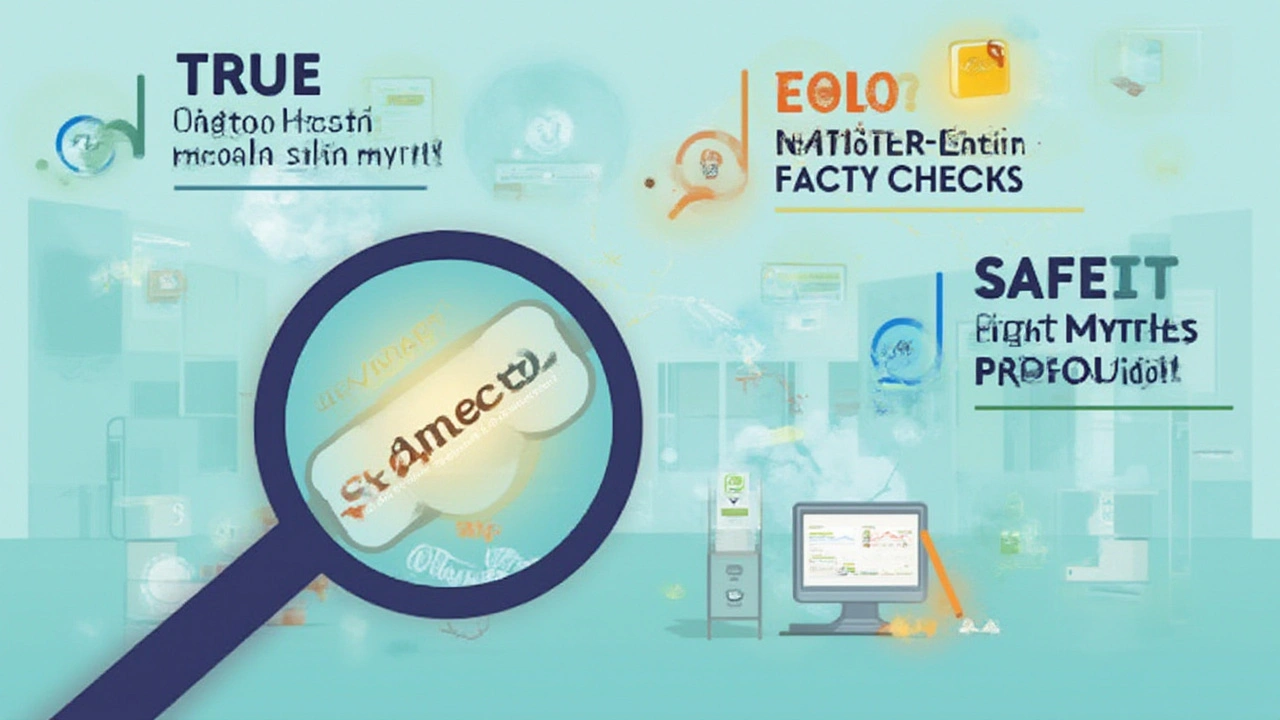
Health July 9, 2025
Stromectol: What You Need to Know About This Medication in 2025
Sit down for a second. There’s a medicine that’s managed to both save lives and stir up drama—sometimes in the same breath. That’s Stromectol, or as your GP might call it, ivermectin. Maybe you’ve seen headlines, internet debates, or chatter in your local pharmacy queue. People aren't just whispering about this stuff—they're arguing. Why all the noise about a simple tablet? Turns out, the story behind Stromectol is twisty, gritty, and packed with lessons about health, trust, and information.
Stromectol’s Real Purpose: From Parasites to Trendy Headlines
Right from the start, let’s cut through the confusion: Stromectol (which is just one of the brand names for ivermectin) was originally made to fight off nasty parasites. We’re talking things like strongyloidiasis, onchocerciasis (that’s ‘river blindness’ for most of us), scabies, and some other critters that can make life downright miserable. What’s wild is that this humble drug actually won a Nobel Prize in 2015. Not the medicine itself, but for the scientists who discovered it, for helping hundreds of millions steer clear of blindness and deadly infections in low-income countries. That’s real-world impact, not theoretical mumbo-jumbo.
Stromectol works by paralyzing and killing parasites inside the body, stopping their wild party before it gets out of hand. It doesn’t just treat people, though—farmers have used ivermectin for years to keep cattle and horses parasite-free (not the Stromectol tablets, mind you, but similar stuff made for animals). In some parts of Africa and South America, annual treatment campaigns have made river blindness almost a thing of the past, which, if you know how devastating that condition is, feels like a miracle.
So how did a humble antiparasitic steal the world’s attention? Enter the COVID-19 pandemic. Suddenly, ivermectin was everywhere. Social media, forums, even dinner tables—everyone had an opinion. Some claimed it was a miracle cure, others swore it was dangerous. Suddenly, doctors were fielding weird questions, and pharmacies ran out of stock. Even major health agencies scrambled to study it in-depth. Here’s the thing: dozens of big, trustworthy trials found it didn’t help with COVID, but the internet didn’t care.
The problem wasn’t just misinformation—it was a lack of trust and confusion about what Stromectol is really for. If you’re thinking of this tablet as a magic bullet for every virus or bug under the sun, that’s asking way too much. But does that mean Stromectol isn’t important? Absolutely not. Its rightful place is as a proven weapon against a specific group of stubborn, often overlooked diseases that still affect millions worldwide.
Just to show how widely this medication is used, here’s a quick look at real stats from 2023:
| Country | Typical use (per year) | Main conditions treated |
|---|---|---|
| Nigeria | 40 million doses | Onchocerciasis |
| India | 12 million doses | Strongyloidiasis, scabies |
| Brazil | 6 million doses | River blindness, head lice |
Clearly, Stromectol isn’t going anywhere soon.
How Stromectol Works: What Actually Happens In Your Body?
Let’s skip the medical jargon. What actually goes on when you swallow a Stromectol tablet? First thing: the drug gets absorbed quickly from your gut and starts hunting down parasites. It jams up the nerve and muscle cells of those pests, paralyzing and then ultimately killing them. It doesn’t touch the nerves in humans, because we have a blood-brain barrier that keeps it out. That’s why it’s safe at the doses used for parasites but not in the gigantic, dangerous amounts some people have tried recently (please never do that, by the way).
Stromectol is usually given as a single dose, sometimes repeated after a week or so, depending on the infection. For example, scabies often needs one dose and then another to catch any eggs that have hatched. It’s taken on an empty stomach with water—not because it tastes weird, but because food can change how quickly it works.
Most folks notice the itching or discomfort from their infection improves in days, sometimes even hours. But, and here's an important bit, just clearing symptoms doesn’t mean you’re parasite-free. You need follow-up and possibly a repeat course, especially if your infection is severe or if you live in an area where reinfection happens a lot. That’s why doctors sometimes want to see you again after treatment—resistant strains of parasites are rare, but they do exist, and not following up can leave you open to a return visit from your six-legged foes.
Stromectol passes out of your system through your liver and intestines, usually within a few days, though traces might linger a bit longer if you have liver issues. Oh, and alcohol doesn’t interfere with the drug itself, but drinking while feeling lousy from a parasite or the medication itself honestly sounds miserable. Add that to the 'don't' list.
One thing people don’t always realize: the way Stromectol works means that, in rare cases, as the parasites die, your immune system could react. This is called the Mazzotti reaction. It’s like picking a fight with your own body—fever, headache, rash, even low blood pressure can appear as the parasites kick the bucket. This doesn’t mean the drug is harming you; it means it’s working. Still, if you feel really dreadful, ring your GP or local health service fast.
By the way, here’s a practical tip: always tell your doctor what meds and supplements you’re on. Stromectol is safe with most drugs, but things like warfarin, immunosuppressants, and anti-epileptics may interact in rare cases. Keep a list or snap a picture of your pillboxes before seeing your doctor. It honestly makes life easier for everyone.

What to Watch Out For: Side Effects, Safety and Myths
Nothing is perfect—not even Nobel-winning medicine. Most people who take Stromectol for parasites breeze through with nothing worse than an upset tummy at worst. But there are a few side effects to watch out for, some common, some very rare:
- Nausea, mild diarrhoea, and dizziness. Nothing dramatic, just kind of annoying.
- Itching or skin rash. This might be from the medication or from your body reacting to dead parasites.
- Headache or muscle aches.
- Swelling of the face, hands, or feet (very rare, but needs quick medical review if it happens).
- Very rarely, confusion, seizures, or vision changes. This is usually in people who take overdoses, have unusual infections, or underlying health issues.
Pregnant or breastfeeding? It’s a grey area. Official advice is to avoid Stromectol in pregnancy unless there’s no other option, simply because studies in humans are limited. The risk seems low, but caution is the rule. For nursing mums, tiny traces can pass to a baby, but the doses are usually so low that it’s not considered dangerous after the first week or so. Always ask your midwife or GP before starting.
Now, about those wild myths. No, Stromectol is not a weight-loss miracle. It doesn’t boost your immune system or prevent viral infections. And no, you absolutely, under any circumstances, should not take the horse paste from your local agricultural shop. That stuff is dosed for animals several times your size, and the fillers inside aren’t meant for humans. Poison centres saw actual cases during the COVID era where people had to be rushed to hospital because they took veterinary versions. Just don’t do it.
Another big myth: once you’ve had Stromectol, you’re somehow protected forever against parasites. Sorry, but the world doesn’t work like that. If you keep traveling in high-risk areas, or your living conditions expose you to parasites, you could get reinfected. That’s why mass distribution needs to happen every year in some regions.
What about resistance? It’s a whispered fear among scientists—that overusing Stromectol could cause parasites to evolve defenses. So far, this hasn’t really happened on a broad scale in humans, though there are isolated reports in animals. Responsible use—prescribed by a doctor, at the right dose—remains the best way to avoid problems in the future.
In short, Stromectol is safe when used as intended, not some magic shield, and not a toy to play doctor with. If you experience anything weird or worrying after taking it, reach out for help fast.
Practical Tips: Stromectol in the Real World Today
So you’ve got a prescription for Stromectol, or you’re just curious if you might ever need it. Here’s how to handle it without fuss, fear, or falling for fads:
- Stick to your schedule. Missing doses or doubling up doesn’t help—take it exactly as prescribed.
- Store the tablets in a cool, dry place, away from sunlight. Steamy bathrooms or stuffy glove boxes are not the best homes for your meds.
- If you get side effects—itch, rash, headache—rest and hydrate. If you have trouble breathing, fainting, or swelling, call for help straight away.
- Ask for a printout of your next appointment or follow-up. It’s easy to forget when symptoms disappear, but you don’t want parasites setting up camp again.
If you’re heading abroad, especially to places where parasites are common, check if you need preventative medication or just basic hygiene advice. Long-sleeved clothes, insect repellent, sleeping nets—sometimes those matter even more than popping a pill.
Here’s something practical from the UK this year: the NHS still only prescribes Stromectol for licensed uses. If a friend from the pub tells you it’ll cure your cold, smile politely and change the subject. If a private online pharmacy offers you a stash without a prescription, think twice—is it even the real thing? There have been multiple seizures of fake ivermectin tablets in the UK, some made of nothing stronger than chalk. Don’t waste your money or risk your health.
If you ever need Stromectol and the pharmacist asks for proof of diagnosis, don’t be offended. They’re making sure the medicine goes to those who actually need it and that nobody gets hurt by pushing boundaries. This is the grown-up way to do medicine in 2025.
And for those who want more data, here’s a quick comparison table on treatments for common conditions from official UK guidance in 2025:
| Condition | First-line Treatment | Stromectol role? |
|---|---|---|
| Scabies | Permethrin cream | Used if creams fail or severe |
| River Blindness | Stromectol (ivermectin) | Mainstay therapy |
| Threadworm | Mebendazole | Rarely used |
See? It’s not always the first choice, but in the right place, it’s essential.
Stay informed, take medicine seriously, and don’t fall for myths—and you’ll be ahead of the pack the next time Stromectol comes up in the news or at the coffee shop.
Write a comment
Items marked with * are required.






17 Comments
Nicole Carpentier July 14, 2025 AT 17:01
I’ve seen this drug save lives in rural Guatemala where my sister volunteers. No hype, just pure science helping people who have zero access to fancy hospitals.
Stromectol isn’t flashy, but it’s quiet magic.
Hadrian D'Souza July 16, 2025 AT 05:25
Oh wow, another glowing ode to the Nobel Prize-winning wonder drug that failed every single COVID trial.
Let me guess-you also think the moon landing was faked because NASA used a slide rule?
It’s not that people are dumb, it’s that they’re desperate enough to believe a pill can fix a virus they didn’t understand in the first place.
Brandon Benzi July 16, 2025 AT 10:52
This is why America’s healthcare system is crumbling. We let foreign governments dictate what medicine we use.
India gives out 12 million doses? That’s not progress, that’s a public health emergency waiting to happen.
We don’t need third-world solutions here.
Abhay Chitnis July 18, 2025 AT 00:26
Bro this is wild 😳
Stromectol for river blindness? That’s like using a flamethrower to light a candle.
And now people think it’s a COVID cure? LOL 🤡
Robert Spiece July 19, 2025 AT 16:51
The real tragedy isn’t that people took ivermectin for COVID-it’s that they trusted a system that didn’t have the guts to say, 'We don’t know yet.'
We turned medicine into a cult. We worship pills like they’re divine.
And now we’re shocked when the priests turn out to be frauds?
Wake up. The problem isn’t the drug. The problem is the faith.
Vivian Quinones July 21, 2025 AT 16:20
I don’t trust big pharma. They made us believe vaccines were safe, then they made us believe ivermectin was dangerous.
Who’s lying?
It’s all the same people.
Don’t fall for the game.
Eric Pelletier July 22, 2025 AT 01:32
Just to clarify for anyone confused: ivermectin’s mechanism of action is GABA-gated chloride channel agonism in invertebrates, which causes neuromuscular paralysis.
Humans lack those receptors in the CNS due to the blood-brain barrier, hence the therapeutic window.
But when you take 10x the human dose-say, from horse paste-you bypass that barrier.
That’s not 'natural healing.' That’s neurotoxicity.
Also, the Mazzotti reaction? That’s a type IV hypersensitivity to dying microfilariae. Not an allergic reaction to the drug.
Read the literature. Don’t read Reddit.
Marshall Pope July 22, 2025 AT 20:23
i read this whole thing and honestly? i just wanna know where to get it if i need it.
not the drama. just the facts.
my cousin had scabies and it worked like a charm.
thx for the info.
Nonie Rebollido July 24, 2025 AT 15:27
huh. i always thought it was just for worms.
so it’s like… the original antiviral?
kinda cool how one thing can do so much. 🤔
Agha Nugraha July 26, 2025 AT 01:03
In India, we’ve used this for decades. No hype, no headlines. Just doctors prescribing it, patients getting better.
It’s not a miracle. It’s medicine.
Andy Smith July 27, 2025 AT 01:39
I appreciate the thorough breakdown. However, I’d like to emphasize that the 2023 WHO guidelines explicitly recommend ivermectin as a single-dose, weight-based treatment for onchocerciasis in endemic areas, and as a second-line option for scabies when topical agents fail.
Additionally, the Mazzotti reaction is not an adverse drug reaction-it’s an inflammatory response to the death of microfilariae, and is managed with corticosteroids, not discontinuation of therapy.
Also, veterinary formulations contain propylene glycol and other excipients that are hepatotoxic in humans.
Do not ingest. Ever.
Rekha Tiwari July 28, 2025 AT 02:11
My uncle in rural Bihar got treated with this in 2018 for river blindness. He could see his grandkids’ faces again 💖
It’s not magic. It’s just… someone cared enough to deliver it.
That’s what matters.
Leah Beazy July 28, 2025 AT 04:32
I used to think this was just for lice or something.
Now I’m like… wow, this little pill has been quietly saving lives for 50 years.
Why don’t we hear more about this?
It’s not sexy, but it’s real.
Respect.
John Villamayor July 29, 2025 AT 17:21
I don’t know why everyone’s so mad about this
if it helps people then why are we fighting about it
just give it to the people who need it
Jenna Hobbs July 31, 2025 AT 04:31
I cried reading this.
Not because of the science.
Because for decades, people in villages with no running water, no clinics, no doctors… got a single pill that gave them back their sight, their dignity, their future.
That’s not medicine.
That’s love in a capsule.
Ophelia Q August 1, 2025 AT 16:06
This made me so grateful for people who work in global health.
They don’t get trophies.
They don’t get TikTok fame.
They just show up.
And this drug? It’s their quiet hero. 💛
Elliott Jackson August 2, 2025 AT 01:47
You know what’s funny?
People act like ivermectin was 'hidden' from us.
As if the entire global medical community conspired to suppress a miracle drug.
Meanwhile, the same people who scream 'big pharma' are the ones who believe a 1970s antiparasitic can cure a 2020s RNA virus.
It’s not a conspiracy.
It’s cognitive dissonance dressed up as rebellion.